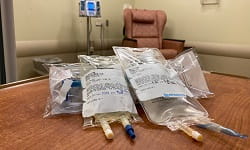
5/17/2021
NOTE: The COVID-19 pandemic is ongoing and clinical and public health recommendations are evolving. This press release and the news it describes may now be outdated. Consult your physician and public health authorities for updated guidance.
PITTSBURGH –
Monoclonal antibodies, a COVID-19 treatment given early after coronavirus infection, cut the risk of hospitalization and death by 60% in those most likely to suffer complications of the disease, according to an analysis of
UPMC patients who received the medication compared to similar patients who did not.
UPMC and
University of Pittsburgh School of Medicine physician-scientists published the findings today in
Open Forum Infectious Diseases, a journal of the Infectious Diseases Society of America. The study involved bamlanivimab, a monoclonal antibody that is now offered only in combination with another monoclonal antibody to further increase its effectiveness—a change mandated by the federal government after the study’s completion.

Monoclonal antibodies are a type of medication that seeks out the COVID-19 virus in a person’s body and blocks it from infecting their cells and replicating. Currently, the
U.S. Food & Drug Administration has granted
Emergency Use Authorization to two monoclonal antibody treatments, which are given through a one-time IV infusion. This is the same type of emergency authorization given to the
COVID-19 vaccines being administered in the U.S.
Federal and
UPMC guidelines require the antibodies be administered within 10 days of COVID-19 symptom onset and diagnosis for patients at high risk of a poor outcome, including patients of advanced age, who are obese or those with conditions such as diabetes or lung disease.
UPMC has given monoclonal antibody infusions to 2,600 qualifying patients. The researchers analyzed data on the first 232 patients treated with bamlanivimab to learn how they’ve fared since their infusions. They compared antibody-treated patients’ data to that of a matched set of patients of similar age and health status who had contracted COVID-19 and were eligible for the treatment but did not receive it.
The strongest effect was seen in older patients. Those age 65 and older who received monoclonal antibodies from UPMC were nearly three times less likely to be hospitalized or die in the following month, compared to their untreated counterparts. The results were less pronounced in younger populations, but overall, more positive results were seen in those who received monoclonal antibody infusions than in those who did not.
UPMC’s data also showed a stronger positive effect the earlier patients received the treatment after contracting the virus, and a very low rate of adverse reactions to the infusion, all of which were mild.

“If there’s one key take-away that we’re seeing in our data, it’s this: If you get COVID-19 and are at higher risk for severe illness, ask your doctor about monoclonal antibodies,” said
Graham Snyder, M.D., M.S., medical director of infection prevention and hospital epidemiology at UPMC and associate professor in Pitt’s School of Medicine. “Don’t hesitate. Early treatment, while your symptoms are still mild, may be essential.”
UPMC offers monoclonal antibody infusions at 18 dedicated infusion sites in Pennsylvania, Maryland and New York, as well as in Emergency Departments, behavioral health centers and patients’ homes. Patients and providers can find out more about monoclonal antibody treatment at UPMC by visiting
upmc.com/AntibodyTreatment or calling 866-804-5251.
Additional authors on this paper are Erin McCreary, Pharm.D., Richard J. Wadas, M.D., Kevin E. Kip, Ph.D., Tami Minnier, M.S.N., R.N., Stephen Koscumb, Kevin Collins, Mark Schmidhofer, M.D., Judith A. Shovel, R.N., Mary Kay Wisniewski, M.T., M.A., Colleen Sullivan, M.H.A., Donald M. Yealy, M.D., David A. Nace, M.D., M.P.H., David T. Huang, M.D., M.P.H., Ghady Haidar, M.D., Tina Khadem, Pharm.D., Kelsey Linstrum, M.A.S., Christopher W. Seymour, M.D., M.Sc., Stephanie K. Montgomery, M.S., and Derek C. Angus, M.D., M.P.H., all of Pitt and UPMC.
PHOTO INFO: (click images for high-res versions)
CREDIT ALL: UPMC
CAPTIONS:
Top: Ryan Bariola, M.D., associate professor in Pitt’s Division of Infectious Diseases and director of the UPMC Community Hospital Antimicrobial Stewardship Efforts (CHASE) Program.
Middle: Monoclonal antibodies are a type of medication that seeks out the COVID-19 virus in a person’s body and blocks it from infecting their cells and replicating.
Bottom: Graham Snyder, M.D., M.S., medical director of infection prevention and hospital epidemiology at UPMC and associate professor, University of Pittsburgh School of Medicine.

 “The fact that we found bamlanivimab to be this effective in keeping our patients with COVID-19 out of the hospital bodes very well for the future use of the currently available monoclonal therapies, something we are studying now,” said lead author Ryan Bariola, M.D., associate professor in Pitt’s Division of Infectious Diseases and director of the UPMC Community Hospital Antimicrobial Stewardship Efforts (CHASE) Program. “If given early to high-risk patients, this treatment works to prevent COVID-19-related complications. We look forward to research with next-generation monoclonal antibodies and hope to continue to find safe and effective treatments for our patients.”
“The fact that we found bamlanivimab to be this effective in keeping our patients with COVID-19 out of the hospital bodes very well for the future use of the currently available monoclonal therapies, something we are studying now,” said lead author Ryan Bariola, M.D., associate professor in Pitt’s Division of Infectious Diseases and director of the UPMC Community Hospital Antimicrobial Stewardship Efforts (CHASE) Program. “If given early to high-risk patients, this treatment works to prevent COVID-19-related complications. We look forward to research with next-generation monoclonal antibodies and hope to continue to find safe and effective treatments for our patients.” Monoclonal antibodies are a type of medication that seeks out the COVID-19 virus in a person’s body and blocks it from infecting their cells and replicating. Currently, the U.S. Food & Drug Administration has granted Emergency Use Authorization to two monoclonal antibody treatments, which are given through a one-time IV infusion. This is the same type of emergency authorization given to the COVID-19 vaccines being administered in the U.S.
Monoclonal antibodies are a type of medication that seeks out the COVID-19 virus in a person’s body and blocks it from infecting their cells and replicating. Currently, the U.S. Food & Drug Administration has granted Emergency Use Authorization to two monoclonal antibody treatments, which are given through a one-time IV infusion. This is the same type of emergency authorization given to the COVID-19 vaccines being administered in the U.S.  “If there’s one key take-away that we’re seeing in our data, it’s this: If you get COVID-19 and are at higher risk for severe illness, ask your doctor about monoclonal antibodies,” said Graham Snyder, M.D., M.S., medical director of infection prevention and hospital epidemiology at UPMC and associate professor in Pitt’s School of Medicine. “Don’t hesitate. Early treatment, while your symptoms are still mild, may be essential.”
“If there’s one key take-away that we’re seeing in our data, it’s this: If you get COVID-19 and are at higher risk for severe illness, ask your doctor about monoclonal antibodies,” said Graham Snyder, M.D., M.S., medical director of infection prevention and hospital epidemiology at UPMC and associate professor in Pitt’s School of Medicine. “Don’t hesitate. Early treatment, while your symptoms are still mild, may be essential.”















